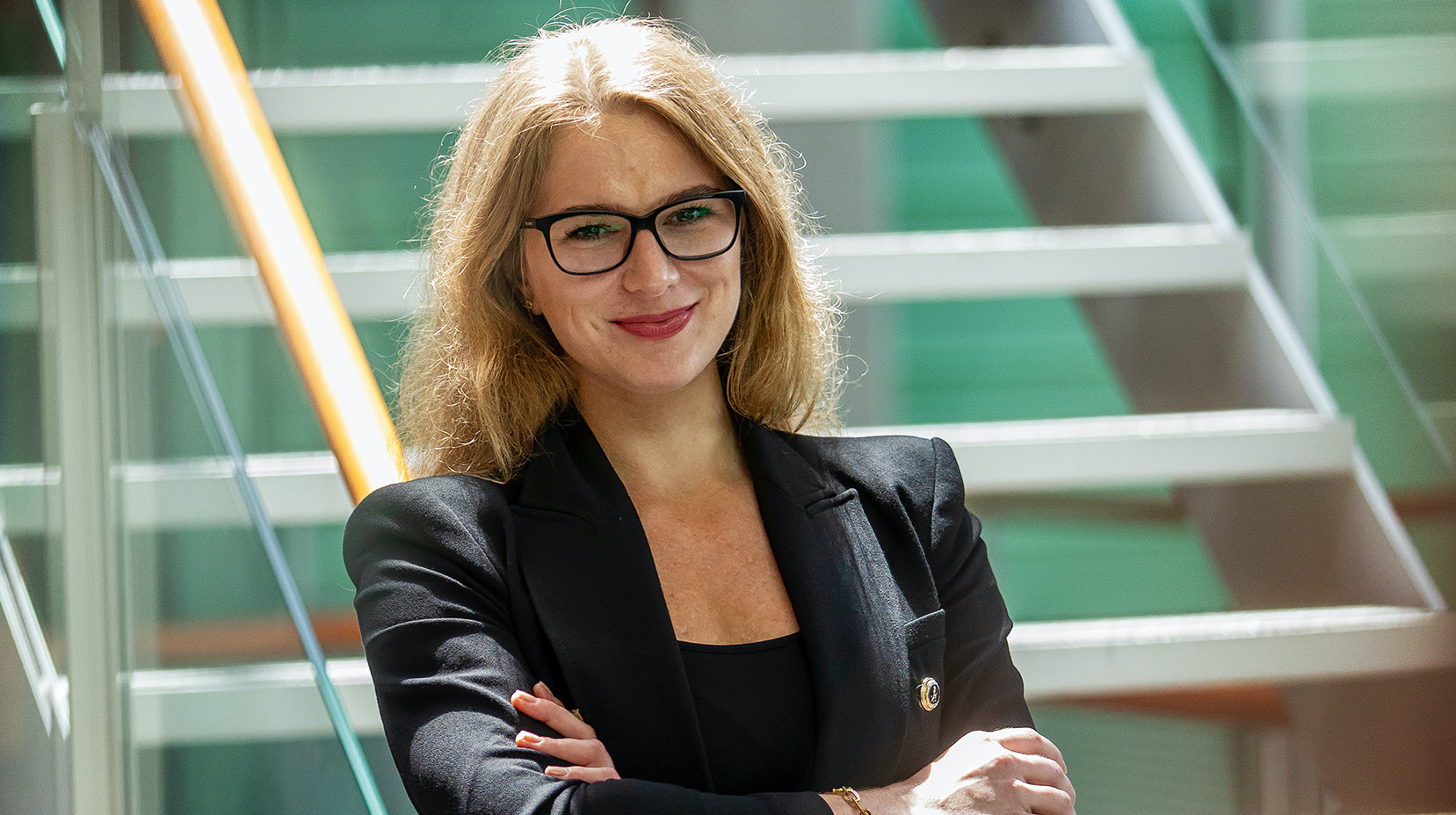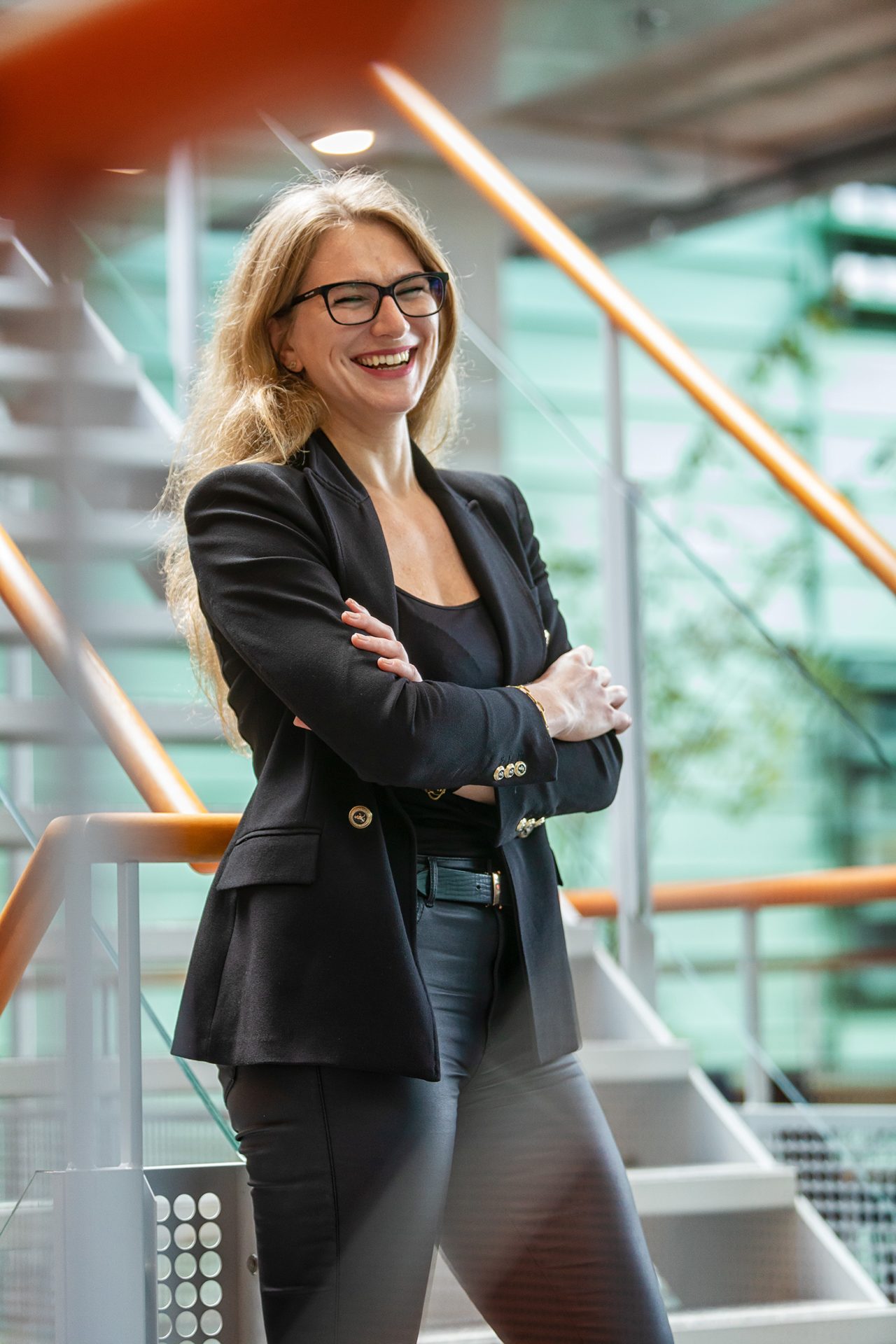Summer interview (9): physical chemist Kinga Matula went from postdoc to CEO
The 32-year-old physical chemist Kinga Matula went from postdoc to CEO of the latest spin-off of Radboud University: QurieGen. Suddenly it is her task to attract national and international investors who make research into drug molecules possible. ‘I’m definitely getting better at short, clear pitches for investors’.
Kinga Matula can still be found in the Huygens building, but she is ready to fly out with her company QurieGen. She came to Wilhelm Huck’s group from Poland, via Germany. There, one of the research projects developed into something that would be better suited as a company. It was up to 32-year-old Matula to lead QurieGen. Something that exactly fits her character.
Underground
As soon as Kinga Matula (32) starts talking about QurieGen, she shifts into high gear. She has told the story many times and many more investors are going to hear it. It is not an easy one. It is about cells, membrane and intracellular proteins, and RNA. For laymen, it is easier to understand when she draws the comparison with a map of the London underground railway system. Suppose you close a line between two stations, a passenger can still get to the desired station via a diversion. The same applies to drug molecules that block one station and diseases that take a diversion afterwards.
QurieGen focuses on mapping all these different pathways in order to identify which drug molecules work and which do not. This information can help the pharmaceutical industry to develop medicines more quickly and avoid testing those that are unlikely to work. It can also help to find new applications for existing drugs or even develop new drug molecules based on novel targets (‘stations’) in the long term.
‘We are now concentrating on how cancer drugs work. The further we get, the more areas we can support’
The official description of this research is: developing single-cell multi-omics tools to quantify dynamics of cellular response and it seems inevitable that the research will ultimately become a commercial spin-off. The demand from the pharmaceutical sector is great, but it is not a technique that can be sold easily. Success depends on the technique in combination with the right team and, above all, more results can be achieved by increasing scale.
Oprah
And so Matula went from being a postdoc to becoming the CEO of a company that has the potential to grow significantly. This is a side-step in a career path that, up to now, has been entirely academic. But it does suit a personality that likes speed, big vision with the goal of helping patients, variety and that is immersive. And so she decided to seize the opportunity. ‘When life is whispering, you have to listen. I didn’t come up with that myself, Oprah said this,’ she says, laughing.
QurieGen is off to a flying start. Pilots were held with Aduro Biotech, Janssen Pharmaceutica and Acerta Pharma. The company won a Venture Challenge, the Take-off programme from NWO and most recently Draper’s Silicon Fall Pitch Prize, which enables Matula to go to Draper University in Silicon Valley for entrepreneurship training as well as to hold discussions with potential investors. Finding investment is important at the moment in order for QurieGen to stand on its own feet and continue to grow.
Bigger projects
The value of QurieGen lies in the proprietary database, but also in the methods that are developed to discover this. Matula receives a lot of requests to apply the platform to certain cells or diseases. ‘I’ve had to say no eight times in a fortnight because we have to stay focused,’ says Matula. ‘We are now concentrating on how cancer drugs work. The further we get, the more areas we can support. And that’s why it’s important to focus on QurieGen and bigger projects that are within the scope of our expertise.’
Kinga Matula has to gradually shift her focus from research to running a company in which she deals with personnel, legal affairs and investments. This also means that she is focusing more on a story to get investors on board. ‘I can remember scientific conferences where researchers hit the audience with an avalanche of information that hardly anyone understood or remembered. I’m getting better at making a short, clear pitch that gets investors to see the potential. That should actually be a compulsory subject at university, I now see how important it is.’ Yet she does not want to spend all her time on business processes, she also sees a role for herself as a researcher and leader. ‘Investors and customers like to see that you understand the subject matter. And I really enjoy the research.’
New drugs
Kinga Matula is from Poland and once had the ambition to study medicine. ‘But how much can you do as a doctor? You can help a limited number of people. If you can improve treatment or develop a new drug, you can help thousands or millions of people.’ She has a broad background; in addition to studying chemical engineering, she studied biotechnology and obtained her PhD in physical chemistry.
She was able to join in the Huck lab for a project that had just started, which evolved into QurieGen. Her career has taken her from Poland via Germany to the Netherlands. But this is not an end in itself. ‘The most important researchers and investors are located in California and around Boston. It makes sense to locate part of the company there in the long run. But it can become a company located both in the Netherlands and in the US.’
Despite impressive achievements for a 32-year-old, Kinga Matula says she did not have an easy time. ‘Because I switched studies, I don’t have as many publications as others who have always focused on one subject. This has also made things difficult for me when applying for funds, where attention was always paid to my age and publications.’
‘The fact that I had a helicopter view thanks to several studies was not taken into account’
Matula found that she wanted to do research that required a lot of money, but that you are only eligible for the big funds if you are an acknowledged professor. In her case, that would mean having to work on her research profile for at least another twenty years, whereas speed is what is important to her. ‘The fact that I had a helicopter view thanks to several studies was not taken into account. Now I see that I can benefit from this. I still believe in the importance of publications, but what I’ve done in the past helps me with what I want to do now and in the future.’
Matula finds the change in her career exciting and has no doubts. ‘It could go wrong, of course, but I’m willing to take that risk. It would be worse for me to regret that I never took the step.’





